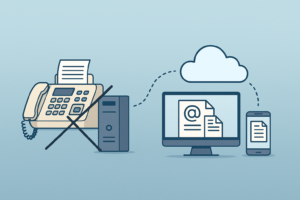Modern businesses have a lot to keep track of. Between endless amounts of paper and a seemingly never-ending stream of emails, it seems like organizations are increasingly encumbered by a lack of cohesion. The act of trying to find the right information to complete a given task might not be a simple action to accomplish, and the hours of the day wasted attempting to do so could slow the entire company down. As the old adage states, "time is money." Those who are not able to perform with agility can suffer from lost customers and revenue, among other things.
Research shows that how organizations manage documents is generally ineffective – namely in the banking and insurance sectors. A study conducted by the Association for Information and Management found that 57 percent of IT professionals in the institutions that populate these industries believe there needs to be a serious change in how these practices are carried out.
"Re-keying data, filing and document retrieval are huge timesinks for most organizations with an 'inability to monitor workflow progress' coming in a close second," wrote FierceContentManagement contributor Lisa McGreevy of the report. "Survey respondents say process changes would lead to increased efficiency, lower costs, improved customer experience and easier regulation compliance. Interestingly, less than 10 percent say process changes would lead to a reduction in headcount."
Going paperless could help solve classic problems
One sentiment that was also expressed in the AIIM study was that many IT workers in banking and insurance believe that paper should be done away with outright – specifically, 41 percent indicated that they felt this way. As more touchscreen interactions begin to replace pen-and-paper operations, this possibility seems increasingly viable.
But in order to be a paperless organization, there have to be certain considerations made. Paper-based tasks are still intrinsically part of many companies – namely those who require fax services. Faxing, contrary to the opinions expressed by doubters, is still a widely-embraced technology that some industries require by regulation. This is mostly thanks to how weakly-defended certain channels like email are. Faxing is a safer way to transmit sensitive materials, but the endpoints that have historically facilitated it are dated in many ways. Putting these functions into the cloud, however, allows for faxing to be updated for modern functionality.
Business's reliance on email is unhealthy
Email is a popular enterprise tool. But just how effective is it for the workplace?
"These days, we don't communicate in the ways that we used to due to advances in technology, and we heavily rely on email for business communication," wrote Business 2 Community contributor Kathleen Olsen. "Unfortunately, we are becoming programmed to jump as soon as we get notification that there is something in our inboxes, and we often spend hours each day just checking emails. This is a great way to not get a lot of work done."
Olsen's solution is to look into email organization applications, but these can merely end up serving as band-aids for a bigger problem. Email is flawed, and rather than try to keep making it work in the ways it needs to, turn instead to a platform that allows for missives to be sent and received in a well-protected manner. This is where cloud-based faxing really comes in handy. By enabling messages to be transmitted to and from physical fax machines as well as mobile applications and – when appropriate – email, companies can halt their dependence on inferior channels and improve the way in which they work.
Enhance enterprise communication, collaboration and compliance efforts with a proven FoIP solution from FaxCore. Contact FaxCore today to learn more about their 'Partly-Cloudy' fax solutions.



